Understanding UK Law and Court Structure
VerifiedAdded on 2021/04/05
|10
|1530
|201
AI Summary
This assignment delves into the complexities of UK law and its court system. It begins by explaining the two sources of law: common law (case law) and statutory law. The process of making laws in the UK is then discussed, including proposal for legislation, Green Papers, White Papers, and Royal Assent. Furthermore, the assignment examines a real-life legal case that required the Supreme Court to consider the defence of fair comment in defamation proceedings. Finally, it provides references to relevant sources, including the judiciary of the UK, Parliament, SOAS University, and the Supreme Court.
Contribute Materials
Your contribution can guide someone’s learning journey. Share your
documents today.
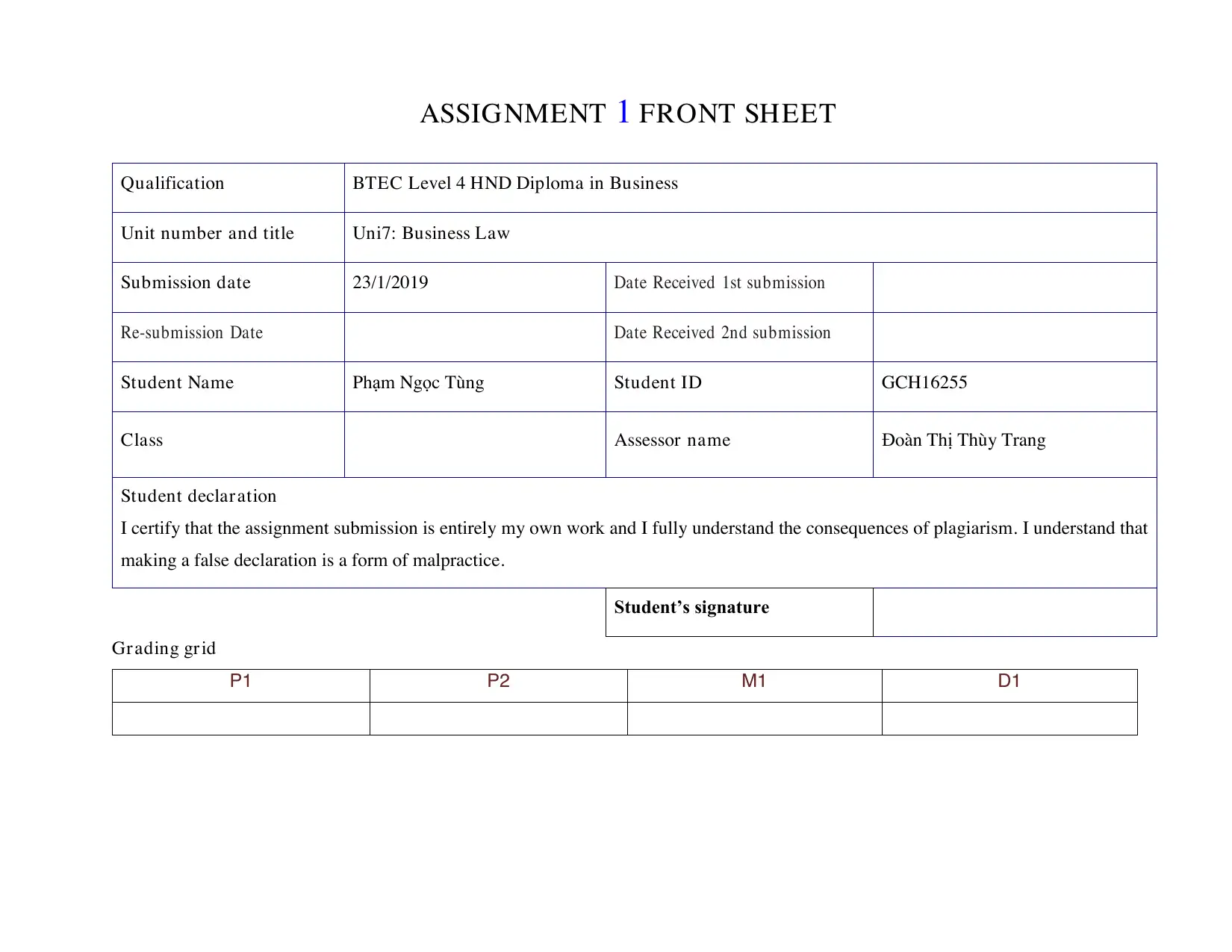
ASSIGNMENT 1 FRONT SHEET
Qualification BTEC Level 4 HND Diploma in Business
Unit number and title Uni7: Business Law
Submission date 23/1/2019 Date Received 1st submission
Re-submission Date Date Received 2nd submission
Student Name Phạm Ngọc Tùng Student ID GCH16255
Class Assessor name Đoàn Thị Thùy Trang
Student declaration
I certify that the assignment submission is entirely my own work and I fully understand the consequences of plagiarism. I understand that
making a false declaration is a form of malpractice.
Student’s signature
Grading grid
P1 P2 M1 D1
Qualification BTEC Level 4 HND Diploma in Business
Unit number and title Uni7: Business Law
Submission date 23/1/2019 Date Received 1st submission
Re-submission Date Date Received 2nd submission
Student Name Phạm Ngọc Tùng Student ID GCH16255
Class Assessor name Đoàn Thị Thùy Trang
Student declaration
I certify that the assignment submission is entirely my own work and I fully understand the consequences of plagiarism. I understand that
making a false declaration is a form of malpractice.
Student’s signature
Grading grid
P1 P2 M1 D1
Secure Best Marks with AI Grader
Need help grading? Try our AI Grader for instant feedback on your assignments.
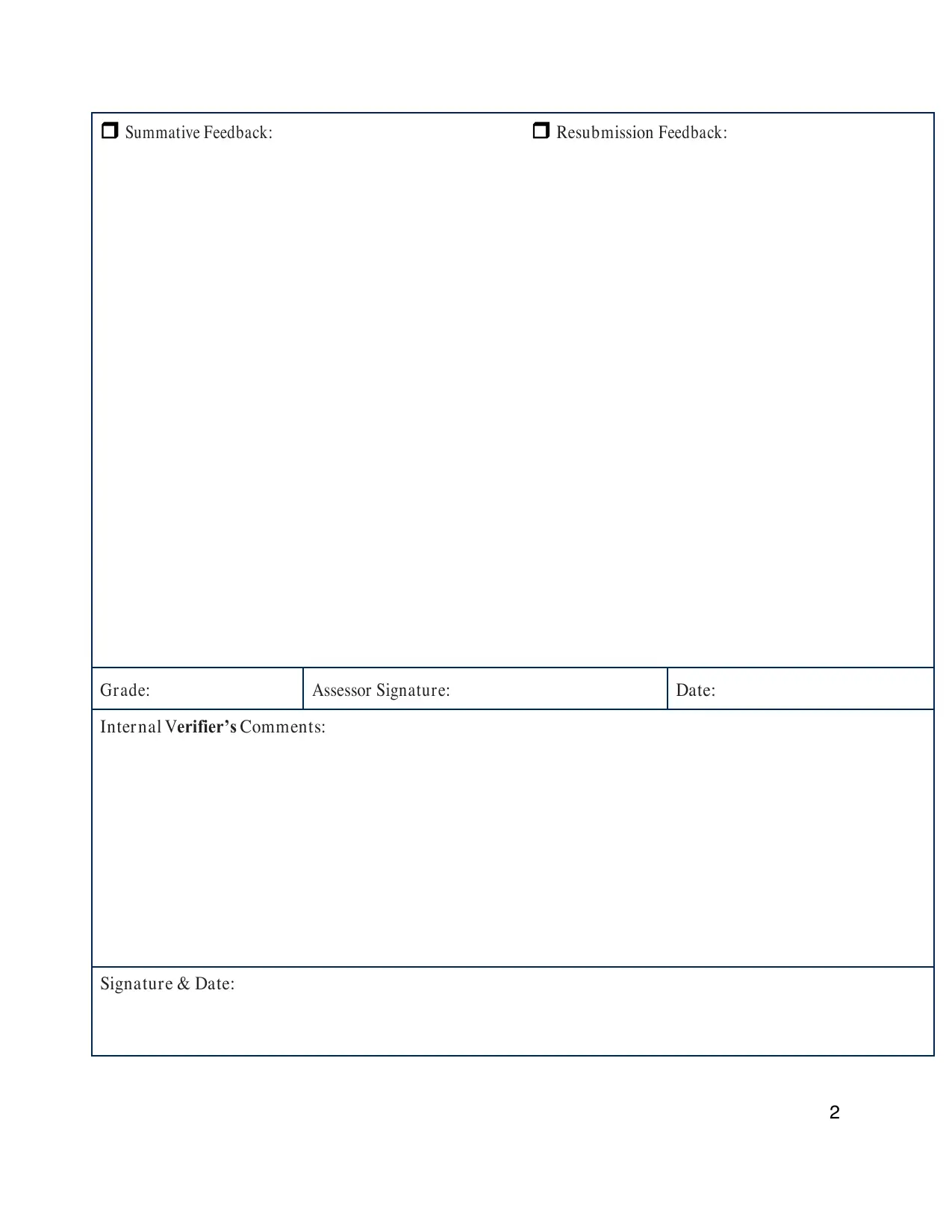
2
Summative Feedback: Resubmission Feedback:
Grade: Assessor Signature: Date:
Internal Verifier’s Comments:
Signature & Date:
Summative Feedback: Resubmission Feedback:
Grade: Assessor Signature: Date:
Internal Verifier’s Comments:
Signature & Date:
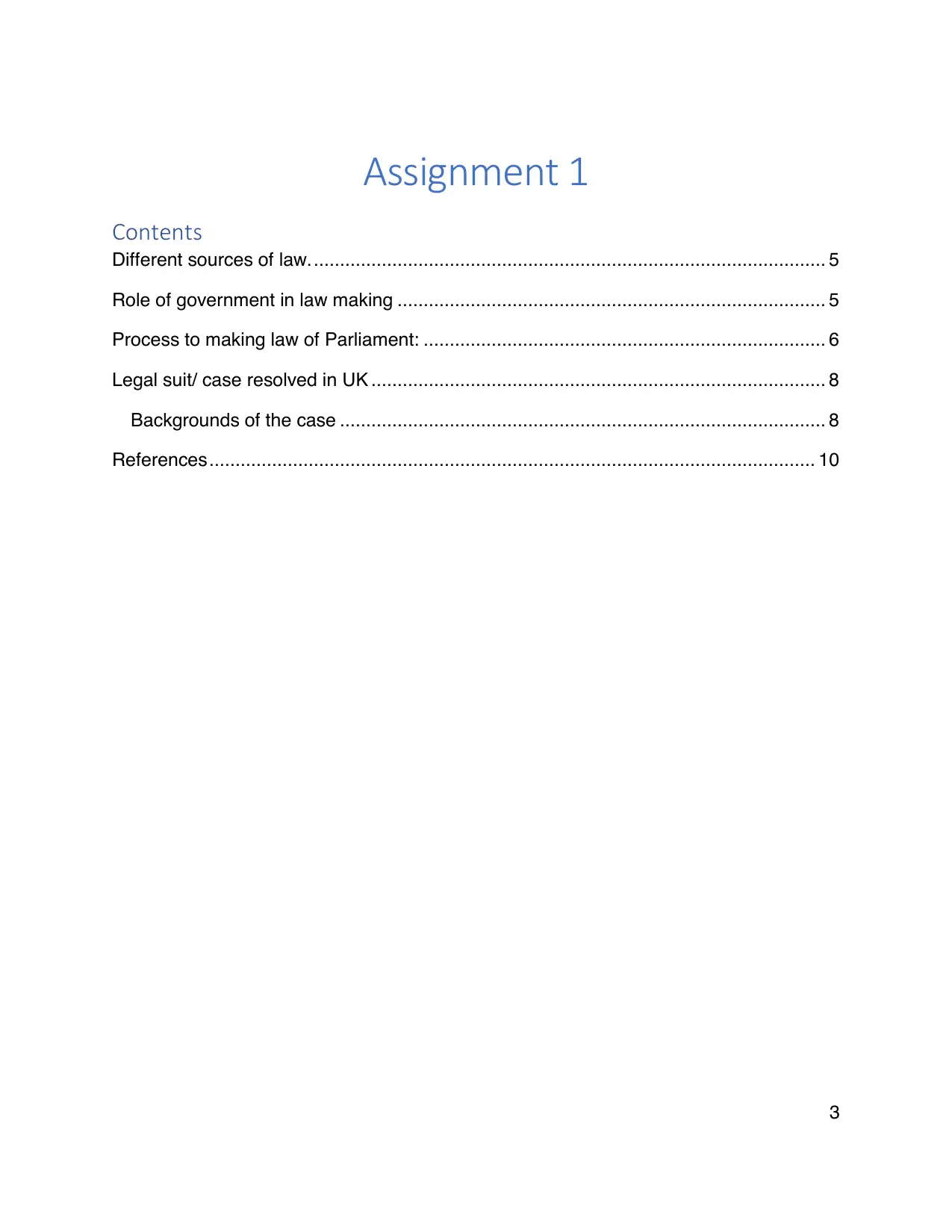
3
Assignment 1
Contents
Different sources of law. .................................................................................................. 5
Role of government in law making .................................................................................. 5
Process to making law of Parliament: ............................................................................. 6
Legal suit/ case resolved in UK ....................................................................................... 8
Backgrounds of the case ............................................................................................. 8
References .................................................................................................................... 10
Assignment 1
Contents
Different sources of law. .................................................................................................. 5
Role of government in law making .................................................................................. 5
Process to making law of Parliament: ............................................................................. 6
Legal suit/ case resolved in UK ....................................................................................... 8
Backgrounds of the case ............................................................................................. 8
References .................................................................................................................... 10

4
Secure Best Marks with AI Grader
Need help grading? Try our AI Grader for instant feedback on your assignments.
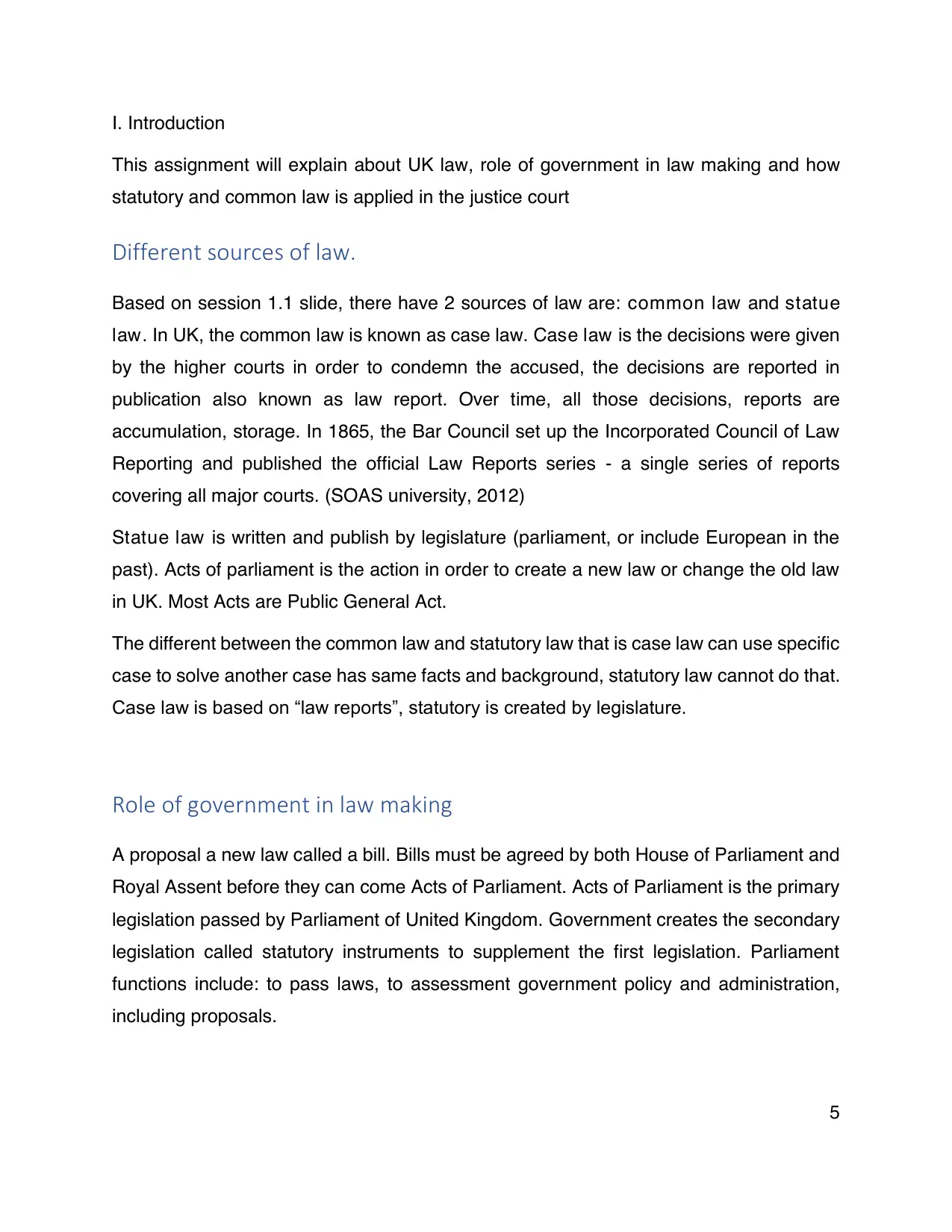
5
I. Introduction
This assignment will explain about UK law, role of government in law making and how
statutory and common law is applied in the justice court
Different sources of law.
Based on session 1.1 slide, there have 2 sources of law are: common law and statue
law. In UK, the common law is known as case law. Case law is the decisions were given
by the higher courts in order to condemn the accused, the decisions are reported in
publication also known as law report. Over time, all those decisions, reports are
accumulation, storage. In 1865, the Bar Council set up the Incorporated Council of Law
Reporting and published the official Law Reports series - a single series of reports
covering all major courts. (SOAS university, 2012)
Statue law is written and publish by legislature (parliament, or include European in the
past). Acts of parliament is the action in order to create a new law or change the old law
in UK. Most Acts are Public General Act.
The different between the common law and statutory law that is case law can use specific
case to solve another case has same facts and background, statutory law cannot do that.
Case law is based on “law reports”, statutory is created by legislature.
Role of government in law making
A proposal a new law called a bill. Bills must be agreed by both House of Parliament and
Royal Assent before they can come Acts of Parliament. Acts of Parliament is the primary
legislation passed by Parliament of United Kingdom. Government creates the secondary
legislation called statutory instruments to supplement the first legislation. Parliament
functions include: to pass laws, to assessment government policy and administration,
including proposals.
I. Introduction
This assignment will explain about UK law, role of government in law making and how
statutory and common law is applied in the justice court
Different sources of law.
Based on session 1.1 slide, there have 2 sources of law are: common law and statue
law. In UK, the common law is known as case law. Case law is the decisions were given
by the higher courts in order to condemn the accused, the decisions are reported in
publication also known as law report. Over time, all those decisions, reports are
accumulation, storage. In 1865, the Bar Council set up the Incorporated Council of Law
Reporting and published the official Law Reports series - a single series of reports
covering all major courts. (SOAS university, 2012)
Statue law is written and publish by legislature (parliament, or include European in the
past). Acts of parliament is the action in order to create a new law or change the old law
in UK. Most Acts are Public General Act.
The different between the common law and statutory law that is case law can use specific
case to solve another case has same facts and background, statutory law cannot do that.
Case law is based on “law reports”, statutory is created by legislature.
Role of government in law making
A proposal a new law called a bill. Bills must be agreed by both House of Parliament and
Royal Assent before they can come Acts of Parliament. Acts of Parliament is the primary
legislation passed by Parliament of United Kingdom. Government creates the secondary
legislation called statutory instruments to supplement the first legislation. Parliament
functions include: to pass laws, to assessment government policy and administration,
including proposals.
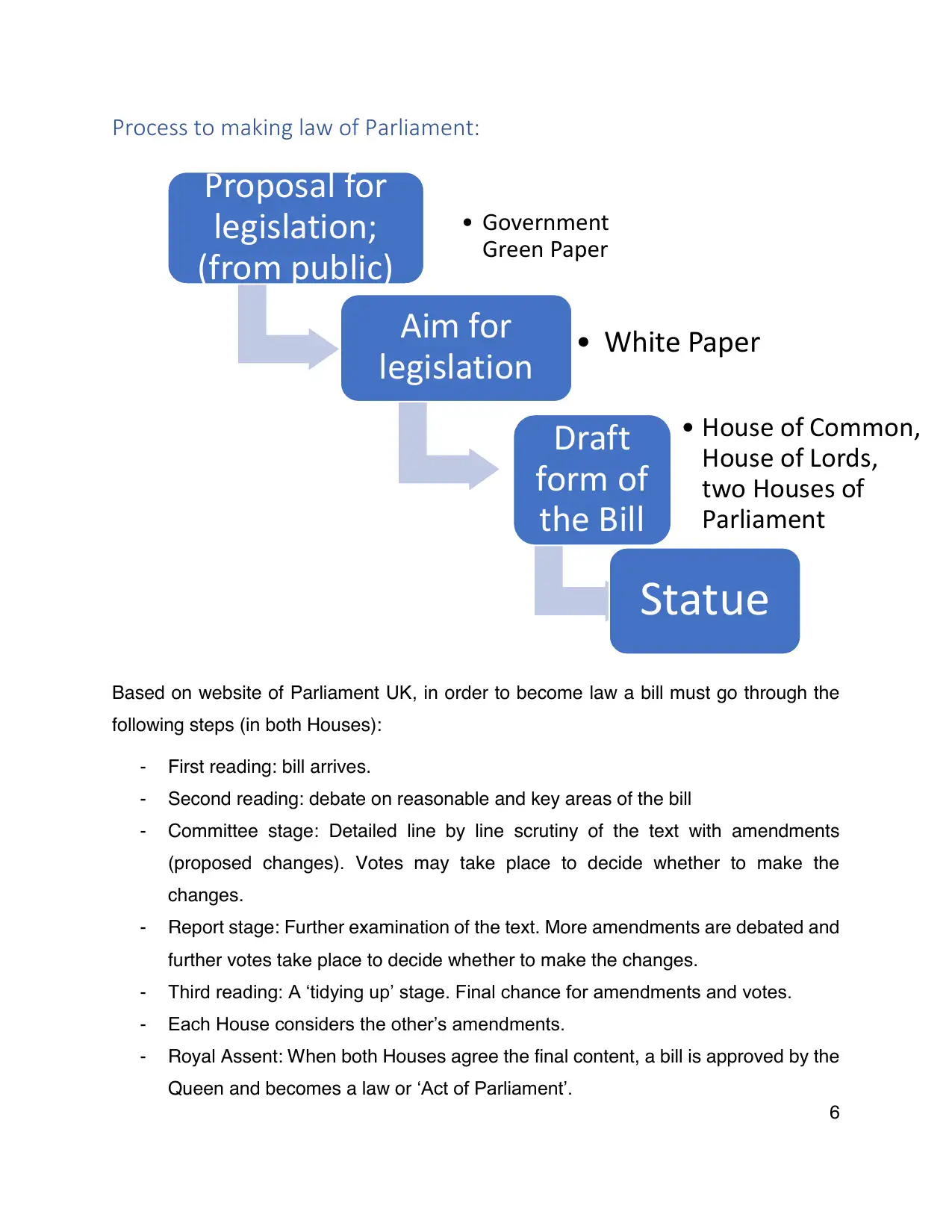
6
Process to making law of Parliament:
Based on website of Parliament UK, in order to become law a bill must go through the
following steps (in both Houses):
- First reading: bill arrives.
- Second reading: debate on reasonable and key areas of the bill
- Committee stage: Detailed line by line scrutiny of the text with amendments
(proposed changes). Votes may take place to decide whether to make the
changes.
- Report stage: Further examination of the text. More amendments are debated and
further votes take place to decide whether to make the changes.
- Third reading: A ‘tidying up’ stage. Final chance for amendments and votes.
- Each House considers the other’s amendments.
- Royal Assent: When both Houses agree the final content, a bill is approved by the
Queen and becomes a law or ‘Act of Parliament’.
Proposal for
legislation;
(from public)
• Government
Green Paper
Aim for
legislation • White Paper
Draft
form of
the Bill
• House of Common,
House of Lords,
two Houses of
Parliament
Statue
Process to making law of Parliament:
Based on website of Parliament UK, in order to become law a bill must go through the
following steps (in both Houses):
- First reading: bill arrives.
- Second reading: debate on reasonable and key areas of the bill
- Committee stage: Detailed line by line scrutiny of the text with amendments
(proposed changes). Votes may take place to decide whether to make the
changes.
- Report stage: Further examination of the text. More amendments are debated and
further votes take place to decide whether to make the changes.
- Third reading: A ‘tidying up’ stage. Final chance for amendments and votes.
- Each House considers the other’s amendments.
- Royal Assent: When both Houses agree the final content, a bill is approved by the
Queen and becomes a law or ‘Act of Parliament’.
Proposal for
legislation;
(from public)
• Government
Green Paper
Aim for
legislation • White Paper
Draft
form of
the Bill
• House of Common,
House of Lords,
two Houses of
Parliament
Statue
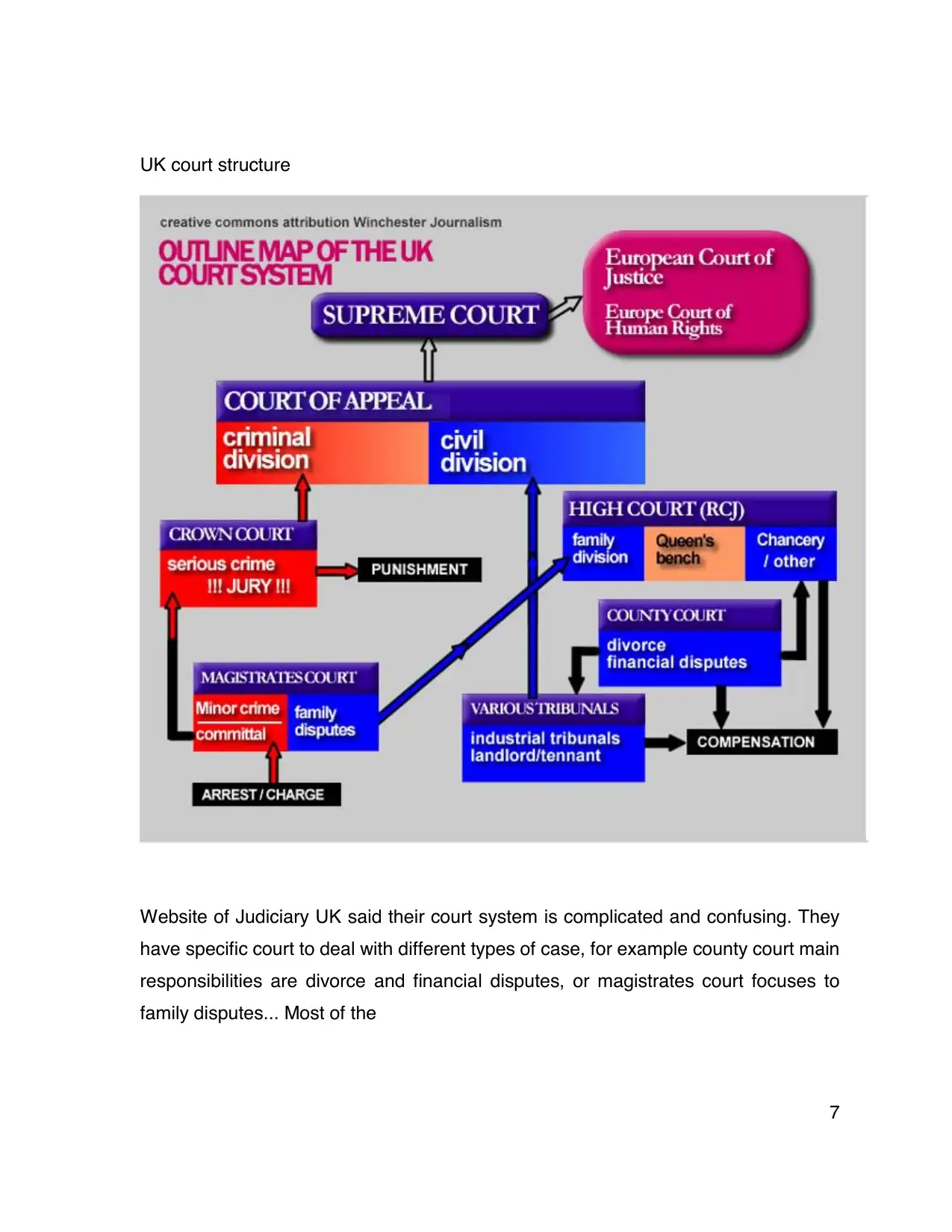
7
UK court structure
Website of Judiciary UK said their court system is complicated and confusing. They
have specific court to deal with different types of case, for example county court main
responsibilities are divorce and financial disputes, or magistrates court focuses to
family disputes... Most of the
UK court structure
Website of Judiciary UK said their court system is complicated and confusing. They
have specific court to deal with different types of case, for example county court main
responsibilities are divorce and financial disputes, or magistrates court focuses to
family disputes... Most of the
Paraphrase This Document
Need a fresh take? Get an instant paraphrase of this document with our AI Paraphraser
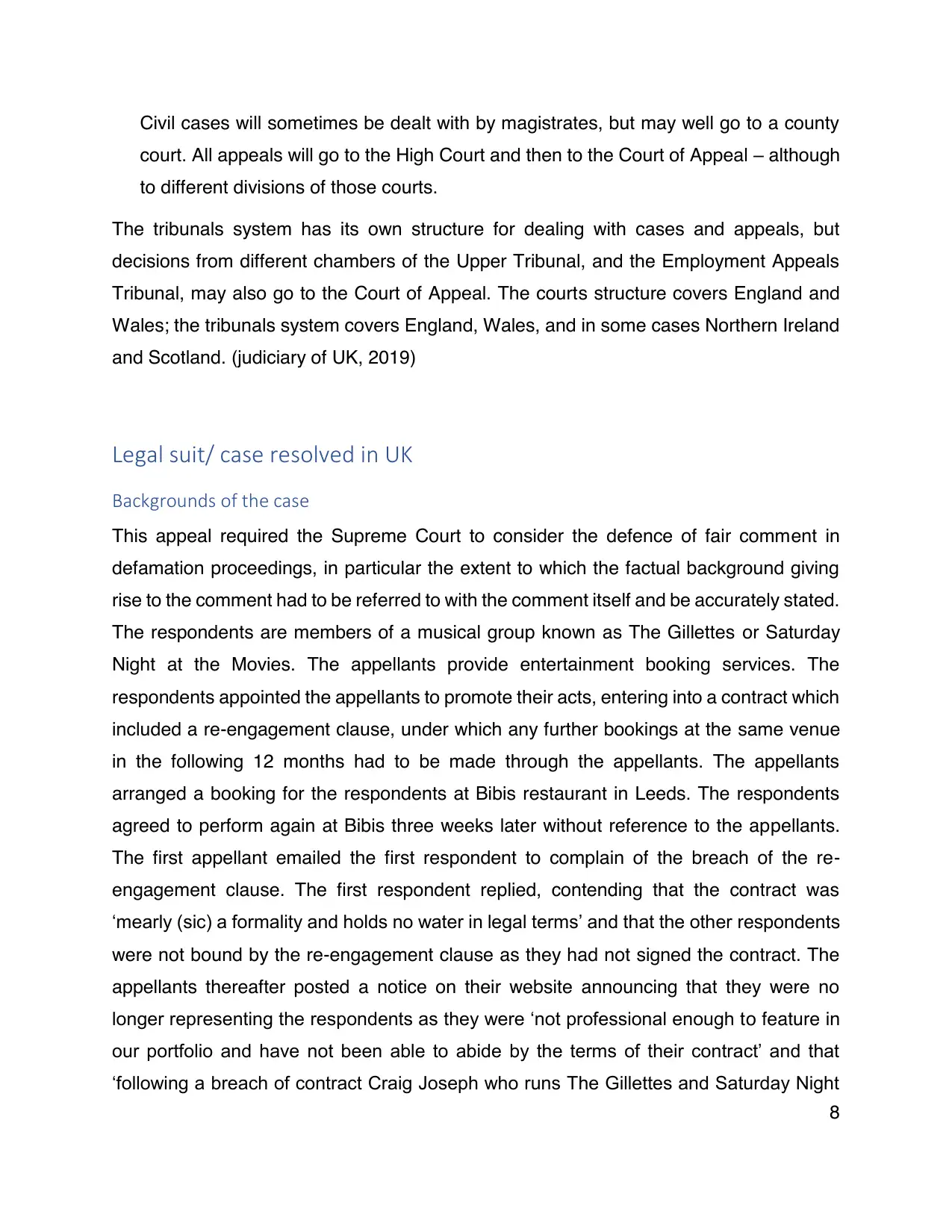
8
Civil cases will sometimes be dealt with by magistrates, but may well go to a county
court. All appeals will go to the High Court and then to the Court of Appeal – although
to different divisions of those courts.
The tribunals system has its own structure for dealing with cases and appeals, but
decisions from different chambers of the Upper Tribunal, and the Employment Appeals
Tribunal, may also go to the Court of Appeal. The courts structure covers England and
Wales; the tribunals system covers England, Wales, and in some cases Northern Ireland
and Scotland. (judiciary of UK, 2019)
Legal suit/ case resolved in UK
Backgrounds of the case
This appeal required the Supreme Court to consider the defence of fair comment in
defamation proceedings, in particular the extent to which the factual background giving
rise to the comment had to be referred to with the comment itself and be accurately stated.
The respondents are members of a musical group known as The Gillettes or Saturday
Night at the Movies. The appellants provide entertainment booking services. The
respondents appointed the appellants to promote their acts, entering into a contract which
included a re-engagement clause, under which any further bookings at the same venue
in the following 12 months had to be made through the appellants. The appellants
arranged a booking for the respondents at Bibis restaurant in Leeds. The respondents
agreed to perform again at Bibis three weeks later without reference to the appellants.
The first appellant emailed the first respondent to complain of the breach of the re-
engagement clause. The first respondent replied, contending that the contract was
‘mearly (sic) a formality and holds no water in legal terms’ and that the other respondents
were not bound by the re-engagement clause as they had not signed the contract. The
appellants thereafter posted a notice on their website announcing that they were no
longer representing the respondents as they were ‘not professional enough to feature in
our portfolio and have not been able to abide by the terms of their contract’ and that
‘following a breach of contract Craig Joseph who runs The Gillettes and Saturday Night
Civil cases will sometimes be dealt with by magistrates, but may well go to a county
court. All appeals will go to the High Court and then to the Court of Appeal – although
to different divisions of those courts.
The tribunals system has its own structure for dealing with cases and appeals, but
decisions from different chambers of the Upper Tribunal, and the Employment Appeals
Tribunal, may also go to the Court of Appeal. The courts structure covers England and
Wales; the tribunals system covers England, Wales, and in some cases Northern Ireland
and Scotland. (judiciary of UK, 2019)
Legal suit/ case resolved in UK
Backgrounds of the case
This appeal required the Supreme Court to consider the defence of fair comment in
defamation proceedings, in particular the extent to which the factual background giving
rise to the comment had to be referred to with the comment itself and be accurately stated.
The respondents are members of a musical group known as The Gillettes or Saturday
Night at the Movies. The appellants provide entertainment booking services. The
respondents appointed the appellants to promote their acts, entering into a contract which
included a re-engagement clause, under which any further bookings at the same venue
in the following 12 months had to be made through the appellants. The appellants
arranged a booking for the respondents at Bibis restaurant in Leeds. The respondents
agreed to perform again at Bibis three weeks later without reference to the appellants.
The first appellant emailed the first respondent to complain of the breach of the re-
engagement clause. The first respondent replied, contending that the contract was
‘mearly (sic) a formality and holds no water in legal terms’ and that the other respondents
were not bound by the re-engagement clause as they had not signed the contract. The
appellants thereafter posted a notice on their website announcing that they were no
longer representing the respondents as they were ‘not professional enough to feature in
our portfolio and have not been able to abide by the terms of their contract’ and that
‘following a breach of contract Craig Joseph who runs The Gillettes and Saturday Night
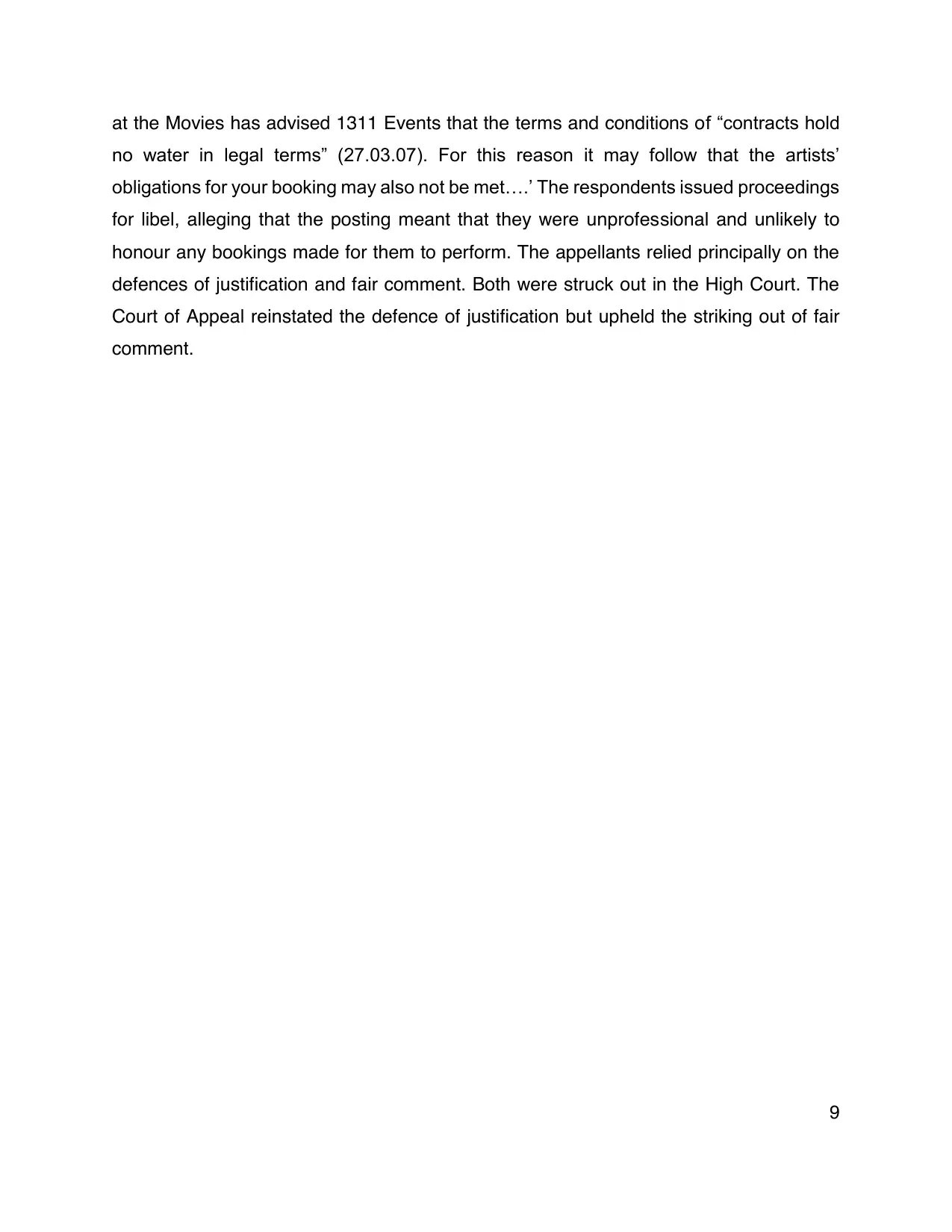
9
at the Movies has advised 1311 Events that the terms and conditions of “contracts hold
no water in legal terms” (27.03.07). For this reason it may follow that the artists’
obligations for your booking may also not be met….’ The respondents issued proceedings
for libel, alleging that the posting meant that they were unprofessional and unlikely to
honour any bookings made for them to perform. The appellants relied principally on the
defences of justification and fair comment. Both were struck out in the High Court. The
Court of Appeal reinstated the defence of justification but upheld the striking out of fair
comment.
at the Movies has advised 1311 Events that the terms and conditions of “contracts hold
no water in legal terms” (27.03.07). For this reason it may follow that the artists’
obligations for your booking may also not be met….’ The respondents issued proceedings
for libel, alleging that the posting meant that they were unprofessional and unlikely to
honour any bookings made for them to perform. The appellants relied principally on the
defences of justification and fair comment. Both were struck out in the High Court. The
Court of Appeal reinstated the defence of justification but upheld the striking out of fair
comment.
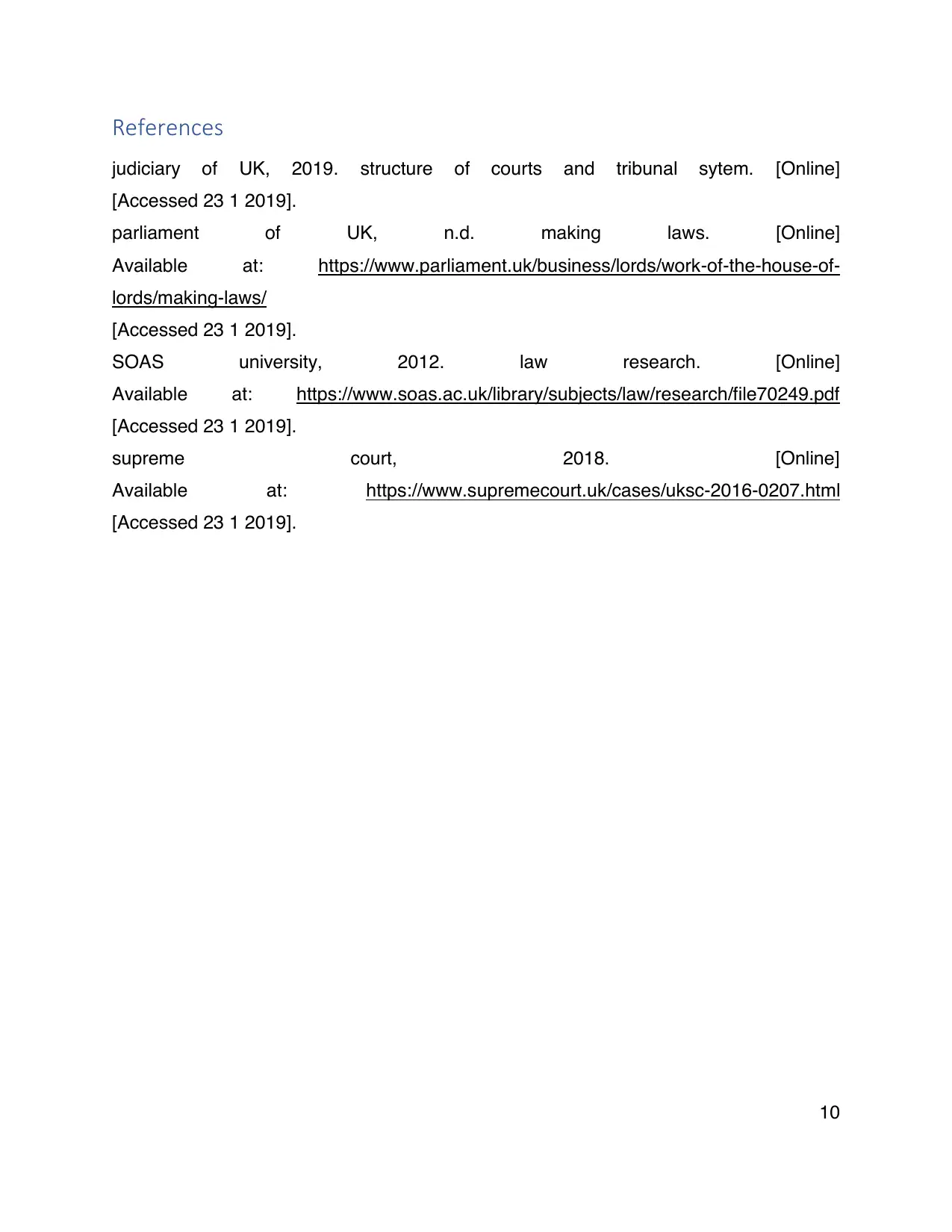
10
References
judiciary of UK, 2019. structure of courts and tribunal sytem. [Online]
[Accessed 23 1 2019].
parliament of UK, n.d. making laws. [Online]
Available at: https://www.parliament.uk/business/lords/work-of-the-house-of-
lords/making-laws/
[Accessed 23 1 2019].
SOAS university, 2012. law research. [Online]
Available at: https://www.soas.ac.uk/library/subjects/law/research/file70249.pdf
[Accessed 23 1 2019].
supreme court, 2018. [Online]
Available at: https://www.supremecourt.uk/cases/uksc-2016-0207.html
[Accessed 23 1 2019].
References
judiciary of UK, 2019. structure of courts and tribunal sytem. [Online]
[Accessed 23 1 2019].
parliament of UK, n.d. making laws. [Online]
Available at: https://www.parliament.uk/business/lords/work-of-the-house-of-
lords/making-laws/
[Accessed 23 1 2019].
SOAS university, 2012. law research. [Online]
Available at: https://www.soas.ac.uk/library/subjects/law/research/file70249.pdf
[Accessed 23 1 2019].
supreme court, 2018. [Online]
Available at: https://www.supremecourt.uk/cases/uksc-2016-0207.html
[Accessed 23 1 2019].
1 out of 10
Related Documents
Your All-in-One AI-Powered Toolkit for Academic Success.
+13062052269
info@desklib.com
Available 24*7 on WhatsApp / Email
![[object Object]](/_next/static/media/star-bottom.7253800d.svg)
Unlock your academic potential
© 2024 | Zucol Services PVT LTD | All rights reserved.





